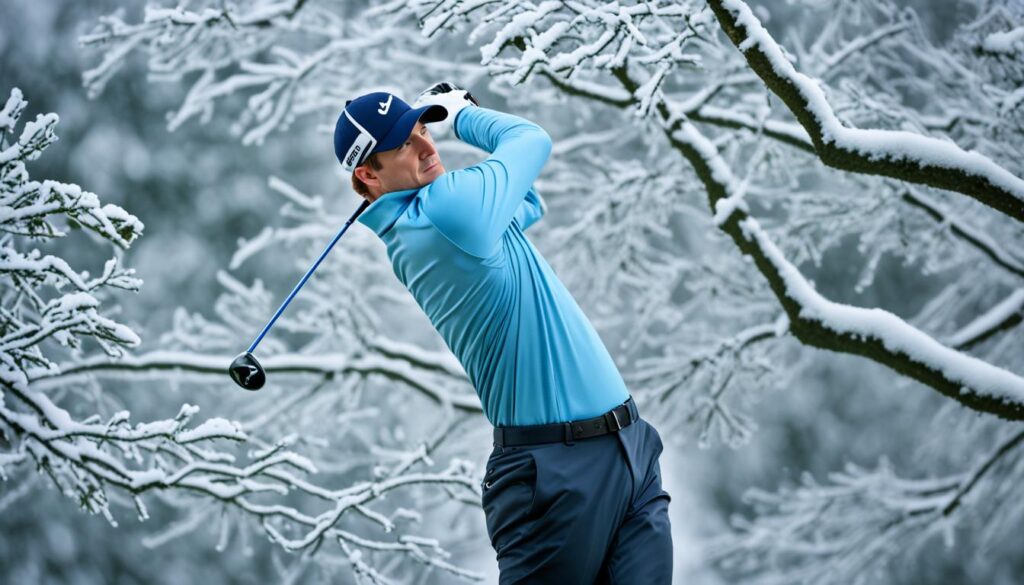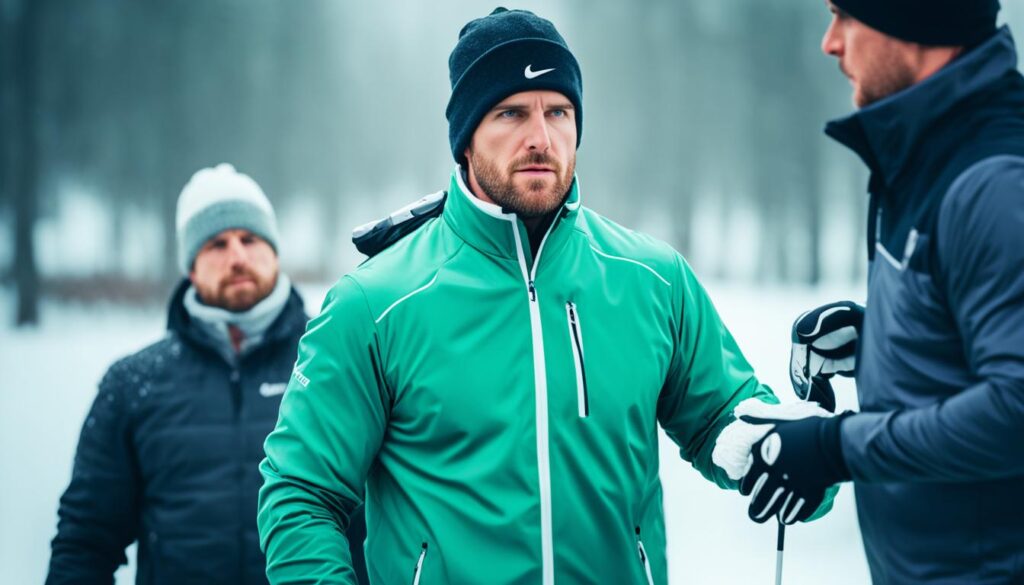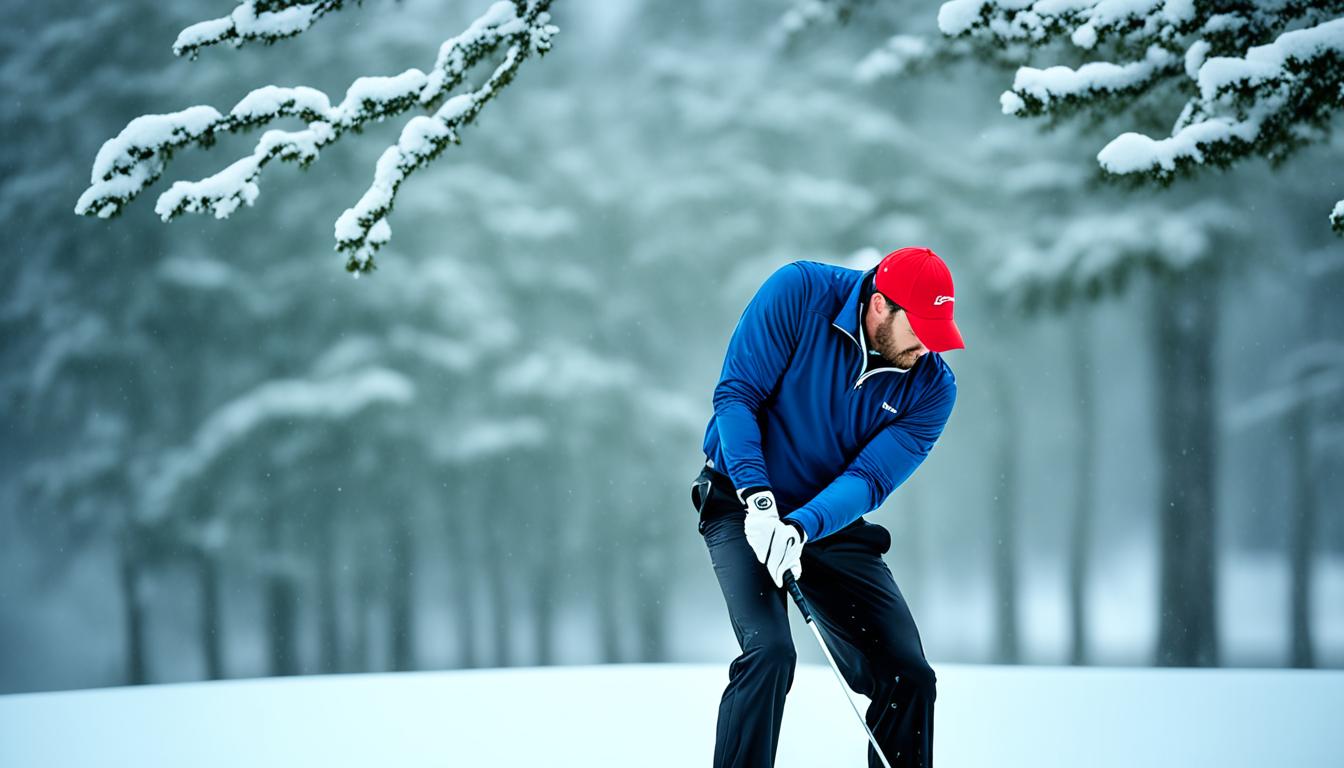Get ready to embrace the cold fairways with a strong spirit and smart changes. Golfers in places like New Jersey know the game goes on, even in the cold. It just changes form. By following these cold weather play guidelines, you’ll know how to stay warm and play well. From wearing cart mitts with hand-warmers to choosing the right golf ball like the Bridgestone e6, you’re all set to face the frosty greens. These inclement weather adaptations are key to keeping your golf passion alive all year.
Playing golf in the winter isn’t just about keeping up; it’s about changing how you play. The winter golf regulations point to New Jersey’s winter league, a 52-year-old tradition. It shows how pros and amateurs alike adapt to the cold. Wearing compression gear, like what Under Armour offers, helps maintain your swing. Dressed in thermal layers that aren’t bulky, golfers can move freely and stay warm in the cold air.
Winter means making temporary golf course adjustments, but the game doesn’t stop for long. It’s about playing all year round, in any weather. The challenge includes investing in things like propane heaters to stay warm. But it’s also about small details. Things like hand warmers help you keep a good grip on your clubs. And proper layering helps fight off the cold. Every smart choice, every temporary golf course adjustment, builds your endurance against the cold and helps your game.
Embracing the Change: Adjusting Your Mindset for Winter Golf
As winter arrives, golfers face special challenges. These require changes in both body and mind. Learning how to adapt to seasonal golfing modifications and understanding adverse conditions policies can make your game fun instead of frustrating.
Getting ready for winter golf means having the right stuff and knowing your game may change. You’ll need extra towels, gloves, special golf balls made for the cold, and hand warmers. They’re key for staying comfortable and keeping your game strong when it’s cold.
- Low-compression golf balls perform better in the cold. They help your ball go farther.
- Extra gloves and hand warmers make sure your hands stay flexible. This lets you swing well.
Using these seasonal golfing modifications also means getting ready for tougher games and icy grounds. Instead of trying to beat your best scores, enjoy playing. Be happy you can play all year thanks to smart adverse conditions policies.
| Element | Impact | Adjustment |
|---|---|---|
| Lower Temperatures | Decreases ball travel distance | Switch to lower-compression balls |
| Wet Conditions | Increase in slips and reduced grip | Use specialized winter golf gloves |
| Economic Benefit | Lower rates in winter | Opportunity to play more rounds cost-effectively |

Knowing and using these changes, as per adverse conditions policies at your local course, dramatically helps in winter. Courses have rules like preferred lies. These help golfers handle the course better in difficult conditions, keeping it playable during cold months.
By resetting your expectations and getting ready, embracing important seasonal golfing modifications, and following adverse conditions policies, golfing in winter can be enjoyable. Even with the cold setting in.
Golf Winter Rules: Understanding Seasonal Adjustments on the Course
When the temperature goes down, golfing gets tougher. Following weather-based rule variations and knowing frozen ground rules is key. Choosing a low-compression golf ball helps with the lessened ball flight and harder ground.
With the cold, courses bring in weather-based rules. One common rule is ‘lift, clean, and place.’ It lets players move their ball within a set area. This is very helpful for dealing with wet, muddy, or semi-frozen grounds that affect playing.
Golfers should try to play when it’s warmer during the day, after the frost has melted a bit. Playing safely and enjoying the game means knowing your limits in cold weather. Slippery spots or hidden ice can increase the chance of getting hurt.
| Winter Adjustment | Description | Benefit |
|---|---|---|
| Modified Tee Boxes | Moving to less waterlogged or frozen areas | Reduces damage to main playing areas and adapts to reduced ball travel |
| Temporary Greens | Used to protect regular greens from frost damage | Preserves quality of primary greens for peak seasons |
| Cart Usage Restrictions | Implementing ‘cart path only’ rules | Minimizes turf damage when soil is soft or wet |
Adapting to these changes helps keep the golf courses in good shape and keeps the game fun during winter. Golfers need to adjust and understand these seasonal rules. They are crucial for safety and keeping the game fair.
Essentials for Cold Weather Golf: Gear Up Right
When it gets colder, golf courses get less busy. But, this doesn’t mean you have to stop playing. Following cold weather play guidelines and golf winter rules lets you enjoy golf all year. The key is to prepare and have the right equipment to handle the cold.
Layering is crucial for winter golf. Start with a base layer that 78% of golfers say keeps them warm. Adding vests and long pants helps keep your body’s core warm and comfortable. Here is a list of must-have winter golf gear:
- Base Layer: Choose ones with thermal qualities. Many brands have tech-enhanced fabrics in both short and long sleeves.
- Vest: It provides extra warmth without affecting your swing. 65% of golfers prefer this.
- Long Pants: They are key for warmth and comfort, with 54% of golfers acknowledging their benefit.
- Waterproof Shoes: They keep your feet dry and warm, a must-have for the winter season.
Being comfortable greatly influences your game. 60% of golfers say walking the course boosts their performance due to more body heat. Keeping your hands warm is also crucial. That’s why 45% of players use hand warmers in the winter.
| Item | Percentage (%) | Importance |
|---|---|---|
| Base Layers | 78 | Essential for core warmth |
| Vest | 65 | Maintains core temperature |
| Long Pants | 54 | Facilitates movement & comfort |
| Hand Warmers | 45 | Keeps hands warm and dexterous |
| Walking the Course | 60 | Increases body heat, improves game |

For a complete winter golf setup, think about these extra items:
- Hat & Gloves: For cold mornings, a beanie and waterproof gloves are crucial.
- Jumper: A wool jumper provides lots of warmth. Choose from various neck styles.
- Waterproof Jacket: It keeps you dry and doesn’t restrict movement.
- Scarf: A cashmere scarf adds warmth without being bulky, allowing easy movement.
By following these cold weather play guidelines, you stay warm. Your game also stays strong, even with winter winds.
Winter Golf Protocols: Staying Safe and Playing Fair
In winter, following winter golf protocols is key for keeping the game fair and safe. From 1 October to 30 April, the rules change to allow preferred lies. This means players can move their ball to a better spot in a certain area. These changes show our sport’s effort to stay fair, no matter the weather. They make sure the game is just, considering how winter affects ball movement and the course.
Clubs adapt their local rules to protect the course and ensure fairness. For example, fairway mats are required to reduce damage to the grass. Using artificially surfaced tees helps avoid wear and tear, keeping scores fair according to National Association guidelines. Sometimes, bunkers might even be closed to keep the handicap system fair during bad weather.
With Model Local Rules, knowing where you can and can’t play is crucial. These rules are marked by white stakes or walls. They keep the golf course’s integrity and handle situations like balls landing on public roads. Such detailed rules help players face winter golf challenges. They guide on avoiding dangerous areas and following local rule changes for penalty areas. By sticking to these protocols, we preserve the game’s traditions through the winter, making sure every part of play is within the spirit of golf.


